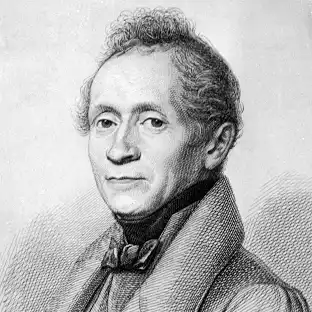
Joseph von Eichendorff (1788–1857) was a German poet, novelist, and essayist, widely recognized as one of the most prominent figures of German Romanticism. His works embody the ideals of nature, individualism, and the mystical longing for transcendence. Eichendorff’s poetry, infused with a deep sense of melody and beauty, explores themes of nostalgia, solitude, and a spiritual connection to the natural world.
Joseph von Eichendorff Biography
Joseph von Eichendorff was born on March 10, 1788, in the Kingdom of Prussia, in the region of Upper Silesia (now part of Poland). Coming from an aristocratic family, Eichendorff’s early life was influenced by the privileged yet turbulent political landscape of Europe at the time. His father, Johann Elias von Eichendorff, was a retired officer, and his mother, Caroline, was part of a well-connected family. Eichendorff’s education was primarily shaped by his intellectual and cultural environment, with early studies at the Gymnasium in Breslau (now Wrocław, Poland) before attending the University of Heidelberg. There, he studied law and philosophy, reflecting the period’s interest in the idealism of German thinkers such as Immanuel Kant and Johann Gottlieb Fichte.
In his early adulthood, Eichendorff joined the Prussian civil service, a career path that allowed him to travel extensively across Germany. His experiences during these years would deeply inform his work, particularly his poems and novels. Eichendorff’s sense of wanderlust and fascination with nature came to the forefront in his poetry, where the natural world is often depicted as a spiritual refuge from the constraints of urban life.
Eichendorff’s literary career took off with his first collection of poems published in 1815, but it was his subsequent works, including the novel Aus dem Leben eines Taugenichts (From the Life of a Good-for-Nothing, 1826), that earned him lasting fame. The novel, considered one of the most important works of German Romanticism, portrays the journey of a carefree and wandering young man in pursuit of personal freedom. Eichendorff’s writing is infused with themes of wanderlust, emotional depth, and the yearning for a deeper connection with the world.
His poetry is often marked by a fluid style, with lyrical beauty and a sense of melodic rhythm that evokes the quiet, introspective nature of the Romantic spirit. Eichendorff’s poetry is also influenced by the folk tradition, blending elements of German folk songs and ballads with a refined literary sensibility. He frequently explored themes of solitude, the passage of time, and the mysterious, sometimes melancholic, relationship between humanity and the natural world.
Despite his success as a writer, Eichendorff lived a relatively quiet life, largely away from the literary circles of Berlin. He continued to work in the civil service throughout his life, which allowed him to maintain a degree of financial stability. His later years were marked by a shift away from active writing, although his works remained influential within the German literary canon. Eichendorff passed away on November 26, 1857, at the age of 69, leaving behind a legacy that continues to resonate with readers today.
Joseph von Eichendorff Poems
Joseph von Eichendorff Quotes
1. “The soul is like a bird that flies freely in the sky.”
2. “The wind sings, the stars glow, the earth whispers its eternal seecrets.”
3. “The world is full of beauty for those who have eyes to see.”
4. “Every step I take is a step toward the unknown.”
5. “Nature is the true home of the soul.”
6. “In every sunset, I see the reflection of my own heart.”
7. “The heart longs for a peace that the world cannot give.”
8. “Silence speaks louder than words in the company of natuire.”
9. “Love is like the wind – it cannot be seen but it can bbe felt.
10. “Life is a journey, and the road is long, but is the heart that gguides us.”
Joseph von Eichendorff Facts
1. Eichendorff was born into a noble family in 1788 in Silesia.
2. He studied law and philosophy at the University of Heidelberg.
3. Eichendorff worked as a civil servant throughout his life.
4. He is best known for his poems, many of which focus on naturelove, and nostalgia.
5. His novel Aus dem Leben eines Taugenichts is a cornerstone ofGerman Romanticism.
6. Eichendorff’s writing is influenced by German folk traditionsand idealist philosophy.
7. He was a major figure in the Jena Romanticism movement.
8. His poetry has been set to music by composers like RobertSchumann and Hugo Wolf.
9. Eichendorff’s works were deeply connected to the natural landscapes of Germany.
10. He died in 1857 in Neisse (now Nysa, Poland), after a life dledicated to literature and civilservice.
